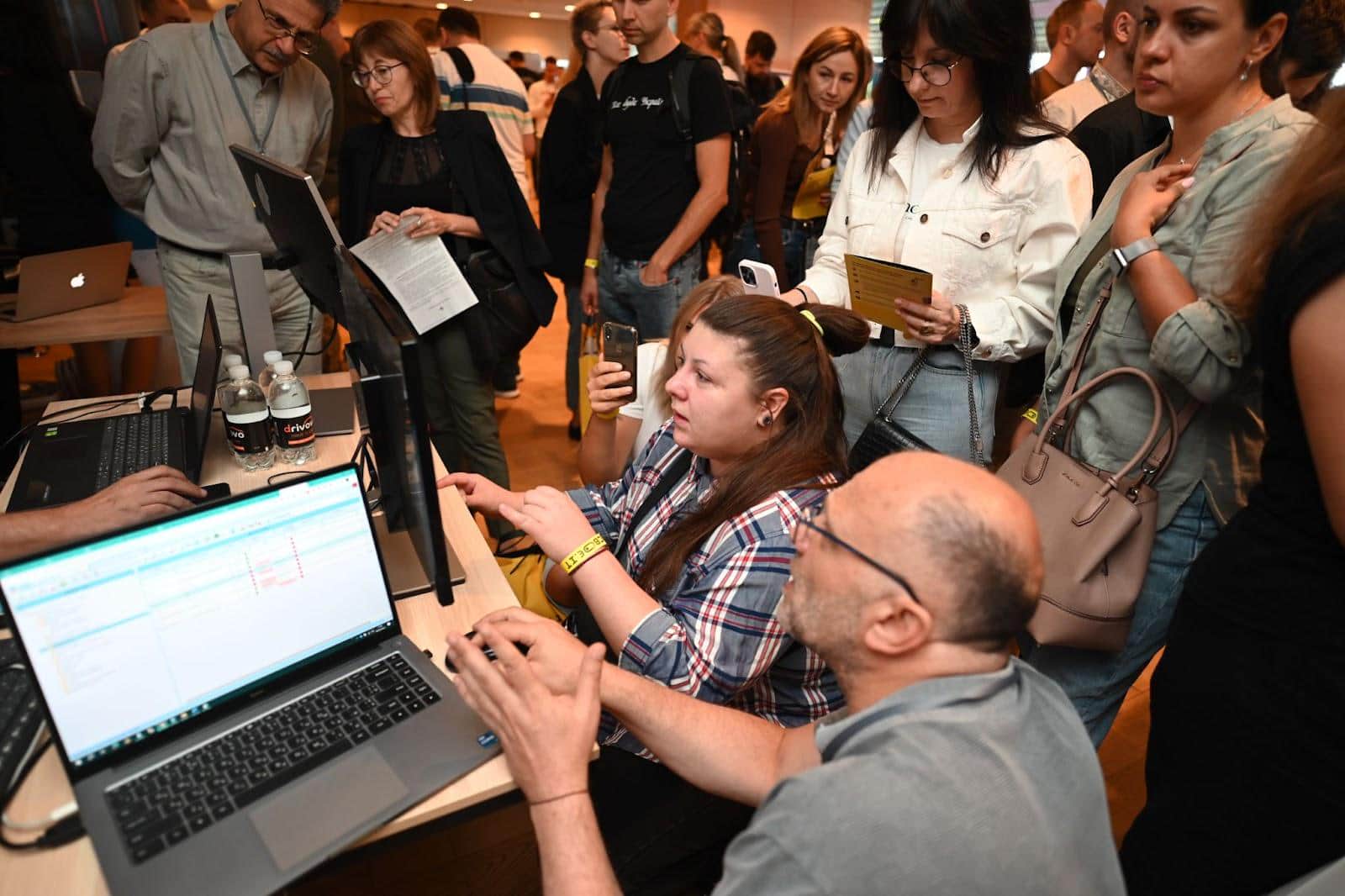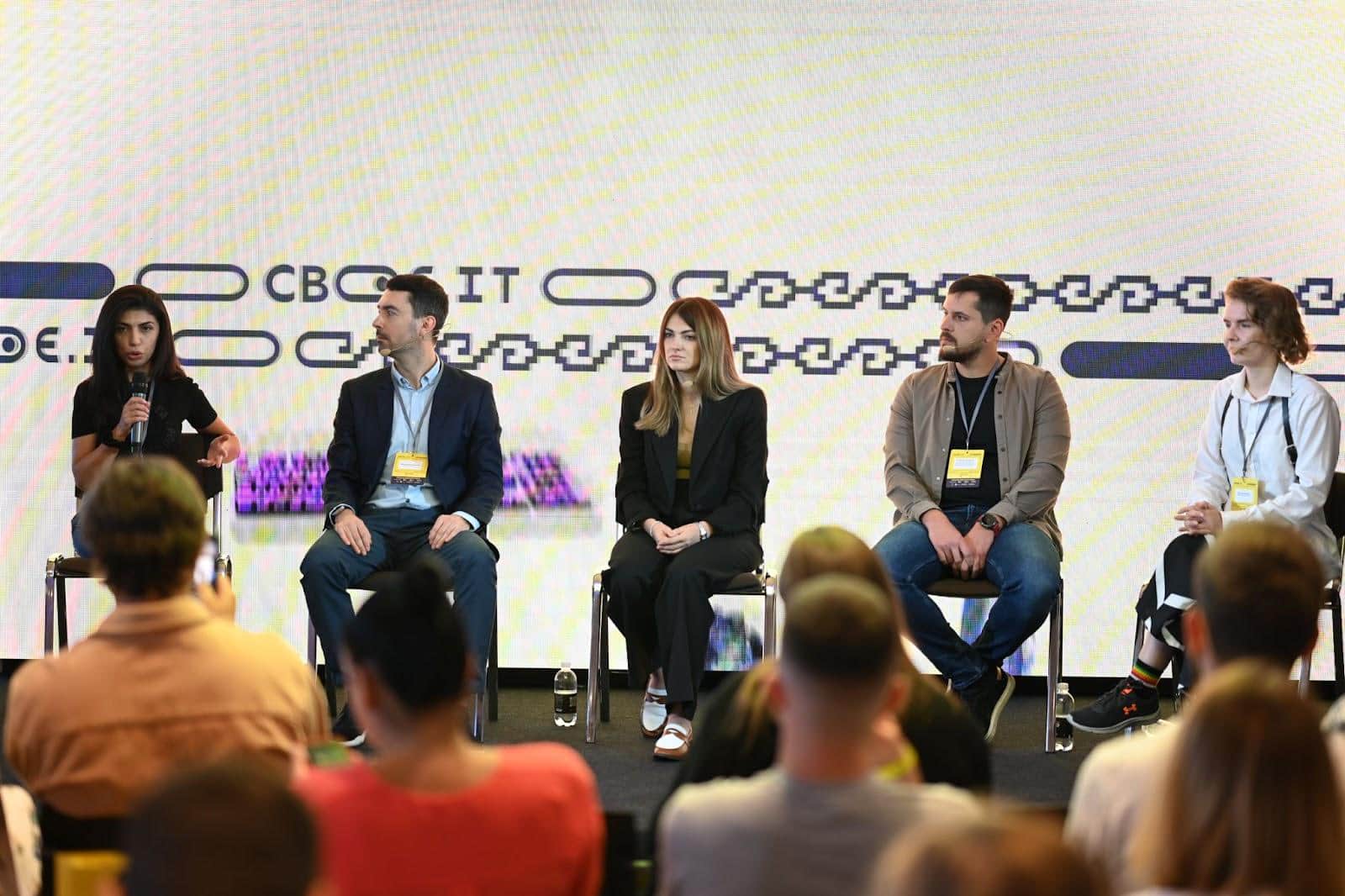Let’s not miss out on our own IT again. Ukraine is getting rid of russian solutions
We have failed. Since the early 90s, we all have missed a chance to develop and support Ukrainian software. We have missed the moment when russian 1C, Bitrix and other software captured our market.
While they were pouring huge costs into their promotion and building a network of integrators -- we have paid no attention to our own, Ukrainian IT. It's high time we gathered stones. Time to choose our own IT.
And the Ukrainians have already taken steps towards this goal at the first Ukrainian software showroom "Svoe.IT". The event brought together dozens of Ukrainian software developing companies and more than 1,500 visitors. Together with invited speakers and participating companies, we found out when russian software will be finally banned, whether business is ready to drop hostile programs, and what future awaits national IT products.
 The first Ukrainian software showroom.Photo: GigaCloud
The first Ukrainian software showroom.Photo: GigaCloud
70% of Ukrainian businesses use hostile software
For the first time, the discussion on banning the use of Russian software was initiated in 2014.
Three years later, in 2017, the National Security Council compiled a list of legal entities and individuals from russia who were prohibited from operating in Ukraine, and Petro Poroshenko signed a decree imposing sanctions against a number of russian IT companies. "1C" LLC, the developer of the ERP system of the same name, also made it to the list. Since the end of the 1990s, the company has 90% of Ukrainian businesses and state organizations hooked on its software.
Advertisement:Ukrainian companies and their specialists, in particular accountants, were sceptical about the sanctions. None of them was willing to give up work in 1C they got used to and spend large budgets on the implementation of a new software.
Some relief was brought to this issue by lawyers who assured that, seemingly, sanctions were imposed only on the company and not on the program itself, so one can continue to use it without breaking the law. And it wasn't until April 15, 2023 that Volodymyr Zelenskyy approved the decision of the NSDC on the 10 year-long introduction and modification of personal sanctions against russian IT companies. Currently, 70% of Ukrainian businesses use the products of the 1C company or its subsidiaries, such as Bitrix24.
According to Oleksandr Bornyakov, Deputy Minister of Digital Transformation, who spoke at "Svoe.IT", despite the russia's bloody war against Ukraine, many companies continue to buy russian software. In particular, 1C operates in Ukraine under a different brand - Business Automation Framework (BAS). This is not only the means of financing the russian military aggression machine, but also a matter of national security, because the enemy actually gains access to Ukrainian information systems.
According to the State Intelligence Service, the most active users of BAS include the leading Ukrainian sellers of electronics and other products, companies in the security and automation sector, as well as pharmacies. State-owned organizations are more controlled by the government, and therefore were forced to abandon 1C. But there are cases of them buying products of russian origin even after February 24, 2022.
Risks of using russian programs
For almost 30 years, 1C and Bitrix24 were monopolists on the Ukrainian software market.
It is difficult to give them up, and this process will take some time. However, many companies are already taking the first steps in this direction for two main reasons: Risk of information leaks.
The Security Service of Ukraine confirms that the use of russian software can lead to violations of confidentiality, security, and access to data in automated systems. Such companies operate under russian laws and, thus, can be used to the benefit of the enemy. This is especially true of software downloaded through torrents.
Some companies continue to use them, putting their business at risk. Risk of mass collapse. In May 2023, Ukrainian Bitrix24 users received a message that the company's cloud service was to officially become unavailable on June 1.
The packaged version would still function in the limited license mode. This has become a big issue for business. And it seems that the same case is going to await yet another russian software.
According to Anatolii Komirnyi, Deputy Minister for Communities, Territories and Infrastructure Development of Ukraine for Digital Development, Digital Transformations and Digitalization, who spoke at "Svoe.IT", before the full-scale invasion, the best service solutions in GPS navigation were offered by belarusian and russian companies. It is scary to imagine what will happen if the enemy gets access to the movement of our goods. Behind a simple GPS sensor, there are strategic matters that enemies will fight for.
 Showroom visitors are testing out Ukrainian softwarePhoto: GigaCloud
Showroom visitors are testing out Ukrainian softwarePhoto: GigaCloud
They "turned on a dime" and work in Ukraine
In order to bypass Western sanctions and keep customers on the Ukrainian market, many russian companies disguise themselves: they change their ownership structure, register legal entities and new trademarks abroad, communicate about the relocation of employees and assure that they have nothing to do with russia.
For example, iiko, which develops software for the automation of the restaurant business, retail trade, and the service industry, did just that. It launched the international brand Syrve. As one of the participants of "Svoe.IT" Rodion Yeroshek, CEO and co-founder of the Ukrainian restaurant automation company Poster, said, Ukrainian establishments buy Syrve because they simply do not know of its true origin.
But there are also those who consciously support the aggressor country.
Industry sanctions implemented by Ukrainian companies
In August 2023, the Ukrainian job search platform Work.ua announced that it would stop cooperating with companies operating in Russia. It also called on other companies to do the same. On the basis of data from the International Sponsors of War website and the Leave Russia project by the Kyiv School of Economics (KSE), Work.ua has created two sanction lists, which in total include more than 200 world-famous companies, together with Coca-Cola HBC, Samsung, Metro, Raiffeisen Bank, etc.
As noted by Work.ua, contract terminations with these brands cost approximately 10 million UAH per year. Work.ua was supported by leading creative, media, marketing, and PR agencies of Ukraine. Together they created an institute of reputation.
 Discussion on sanctions against russian softwarePhoto: GigaCloud
Discussion on sanctions against russian softwarePhoto: GigaCloud
What's next?
At the beginning of the article, I noted that 70% of Ukrainian businesses still use russian software.
There are several reasons for that: habit, ignorance of users, or cost of switching to a new solution. That is why the process of dropping the hostile software will not be as fast as one would like, but it will definitely happen. We took the first step towards it.
On September 8, 2023, our team gathered Ukrainian developers and integrators so that they could show that Ukrainian software exists, and it is of high quality and technology. "Svoe.IT. Showroom of Ukrainian software" showcased more than 30 IT solutions: CRM and ERP systems, programs for accounting and document management, services for call centers and technical support services, ED Tech solutions.
Visitors could test these programs and choose the ones that suit their business best. This format greatly simplified the choice and shortened the time it would take to look for the right software. We have the excellent experience of our ancestors, who have already once changed the course of popular consciousness and helped our economy to "stand strong".
We are talking about the principle of "birds of a feather flock together", which stimulated the development of Ukrainian production and our own business. Our turn has come. And while our soldiers are fighting for our independence on the battlefield, we should help Ukrainian IT companies to win back the Ukrainian IT market.
After picking a new software, it takes about two to three years to fully implement it. Because it is not just about transferring data from one system to another. Here comes a program setup, its refinement, process integration, employee training, and so on.
This process should be systematic and smooth. Therefore, the sooner a business starts looking for a new software, the safer its future is going to be.
Disclaimer: Articles reflect their author's point of view and do not claim to be objective or to explore every aspect of the issues they discuss. The Ukrainska Pravda editorial board does not bear any responsibility for the accuracy of the information provided, or its interpretation, and acts solely as a publisher.The point of view of the Ukrainska Pravda editorial board may not coincide with the point of view of the article's author.